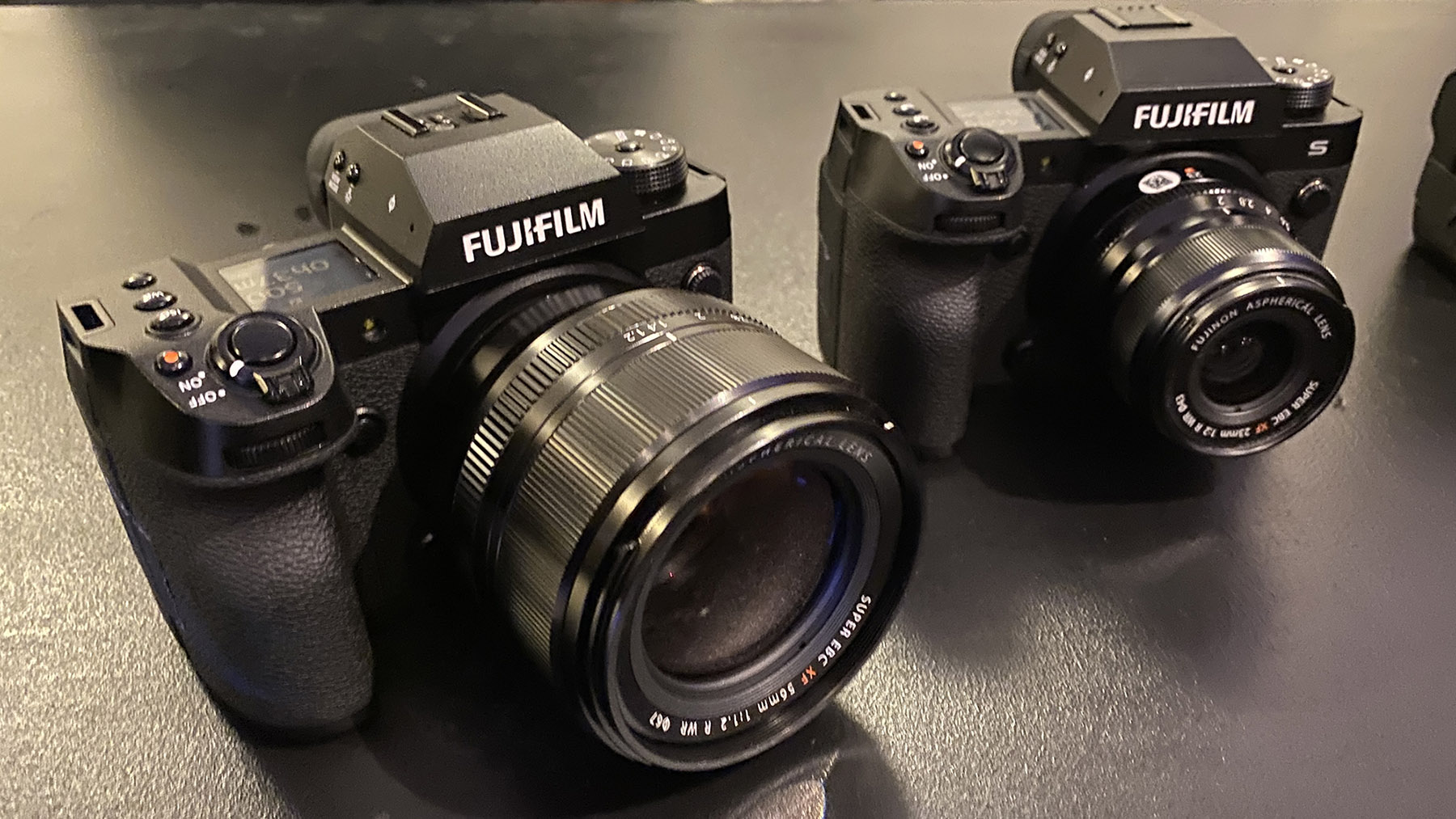Refresh
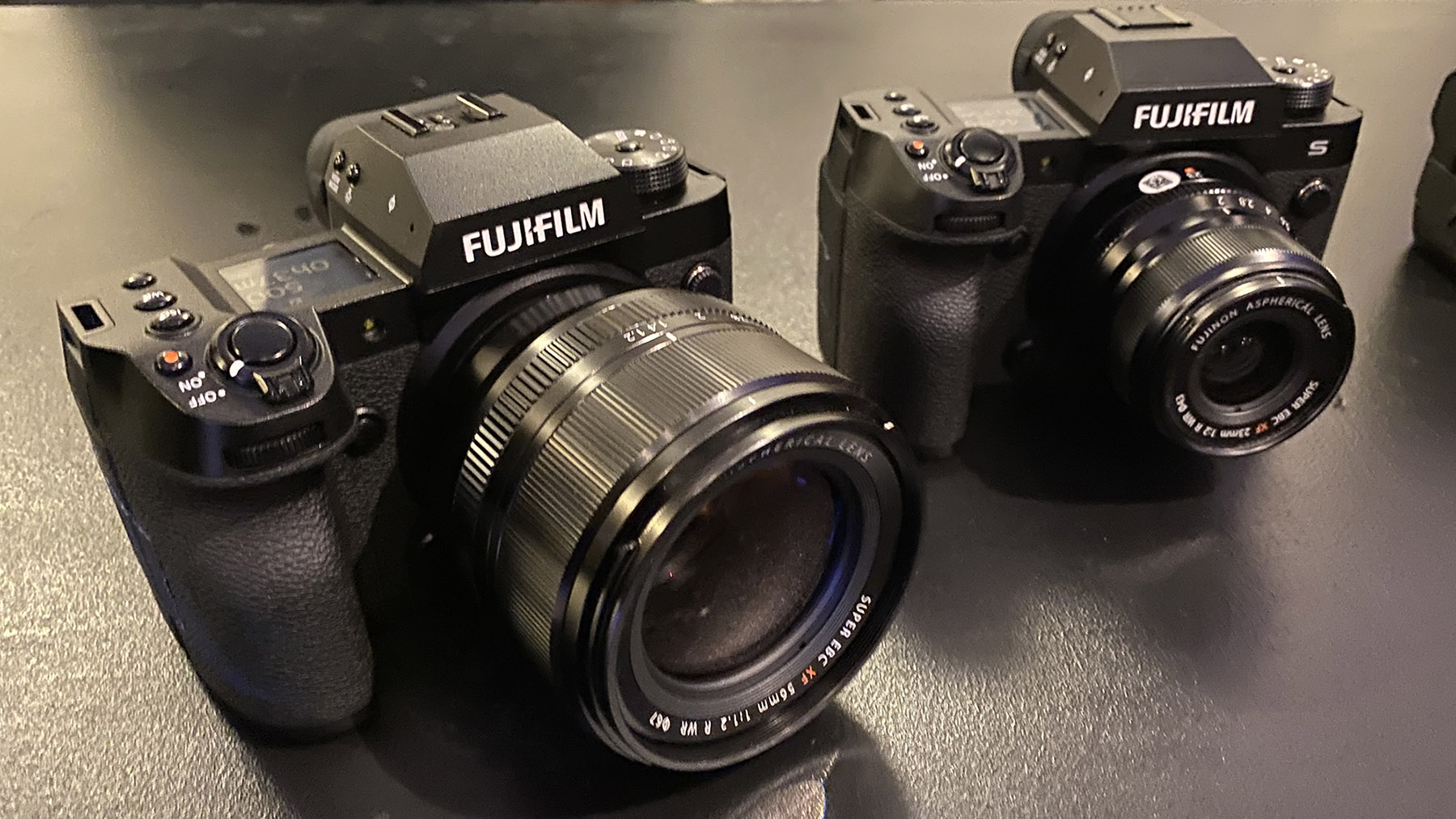
And here, sitting modestly behind all of the photo galleries, are Fujifilm’s two new flagship APS-C cameras: the X-H2 (on the left) and the speedy X-H2S (on the right).
It still think the naming is incredibly confusing, but what a combo of cameras these would be to own. And what’s that on the front of the X-H2? It’s the XF56mm f/1.2 I’ve been trying track down all day. Now to see if I can borrow one for a few hours…

Here’s another couple of lovely desert landscapes taken on the Fujifilm X-H2 by Bryan Minnear, this time using the new XF150-600mm f/5.6-8 LM OIS WR.
I had the pleasure of shooting with that lens for my Fujifilm X-H2S review last month. And while it certainly isn’t a low-light king, it offers incredible reach in a relatively small package when compared to some full-frame sports setups.
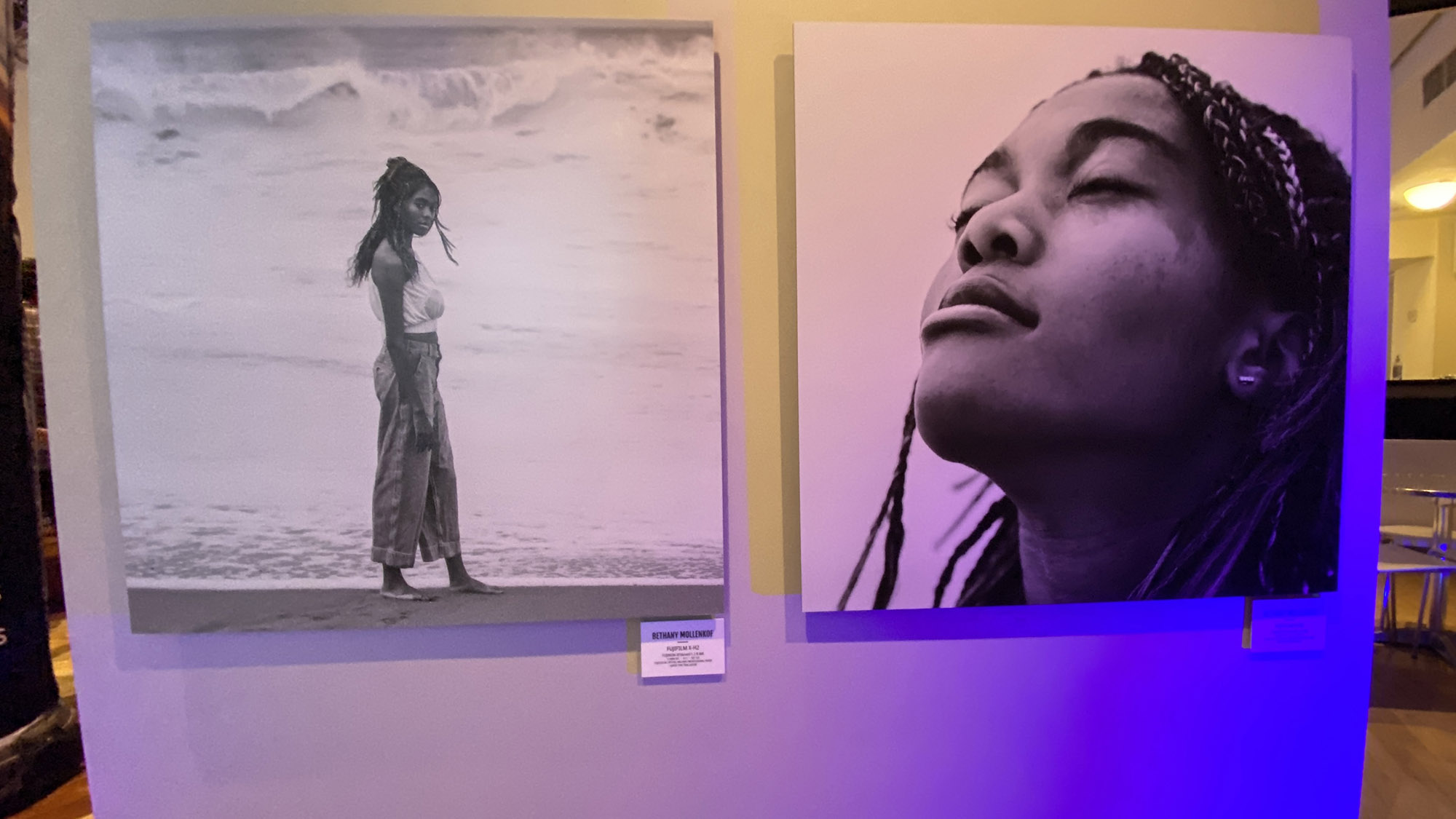
Here at the X-Summit in New York, Fujifilm has set up a rather impressive mini gallery of snaps taken with the new X-H2.
These shots from Bethany Mollenkof were taken with the new XF56mm f/1.2 R WR, a lens I’m particularly keen to get my hands on soon. Time to see if there are any samples squirrelled away in a secret cupboard.
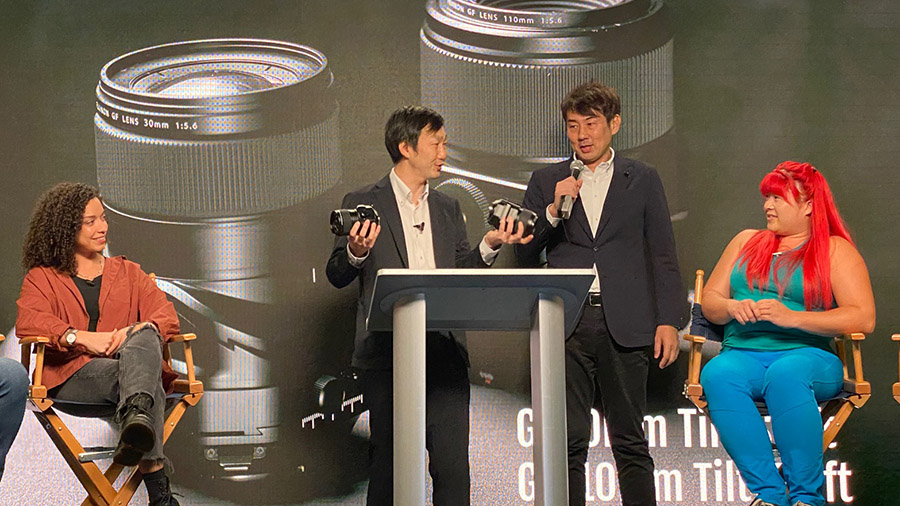
Fujifilm did have a classic ‘one more thing’ up its sleeve after all! It’s developing not just one but two tilt-shift lenses – a GF80mm and GF110mm macro tilt shift lens. Specialist lenses for sure, but they sounds fun. Now to see if we can get our hands on them…
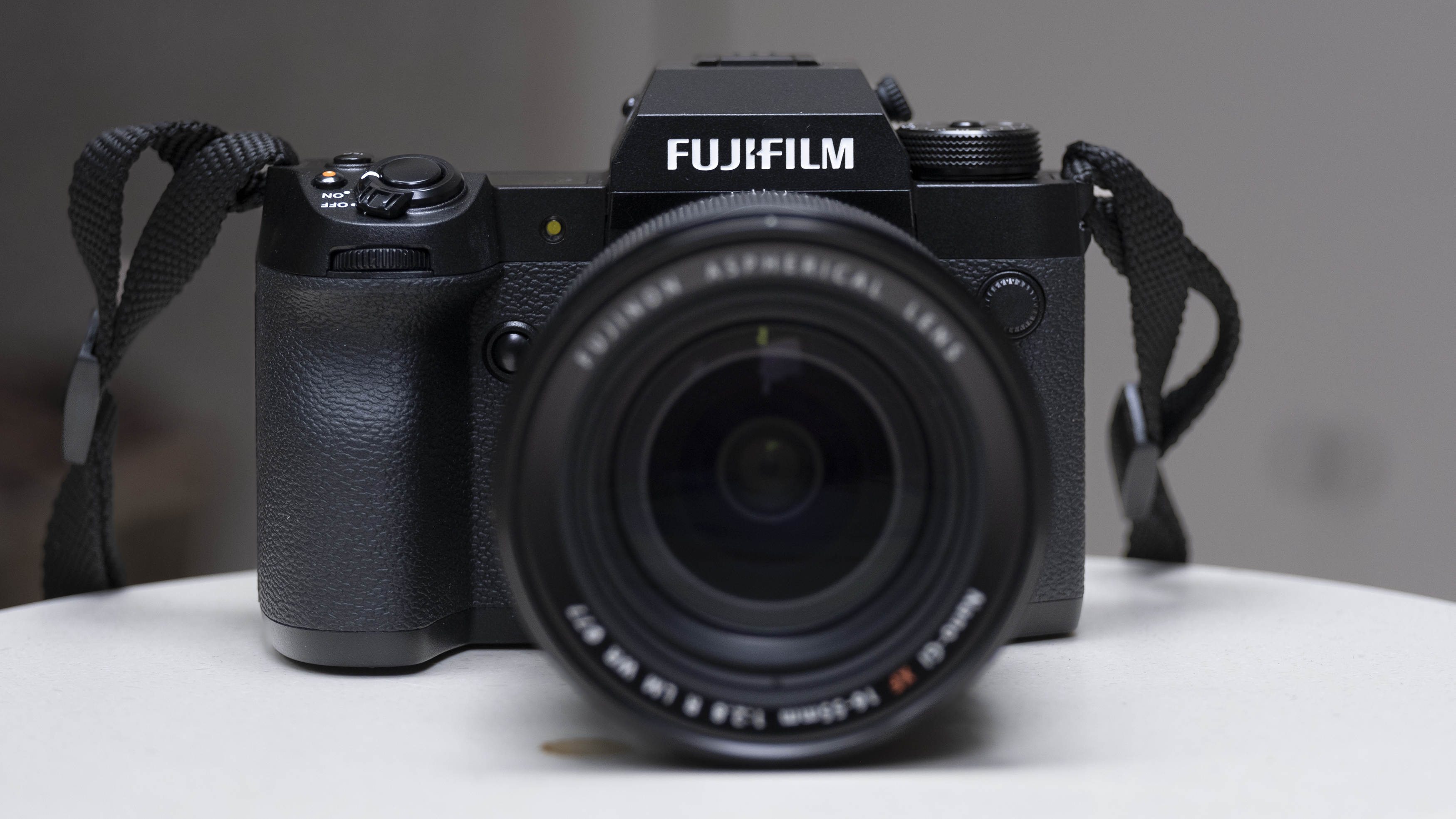
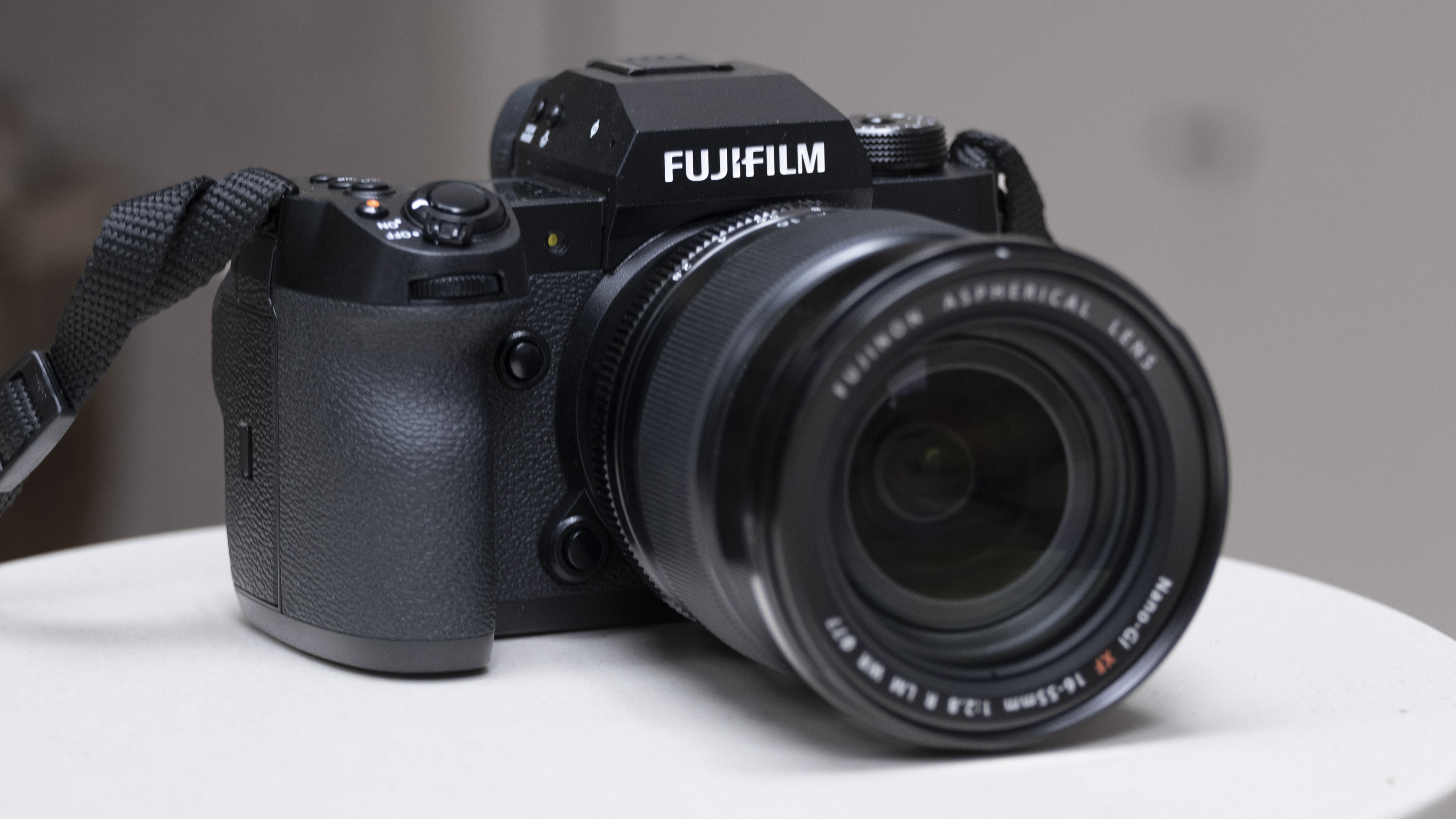
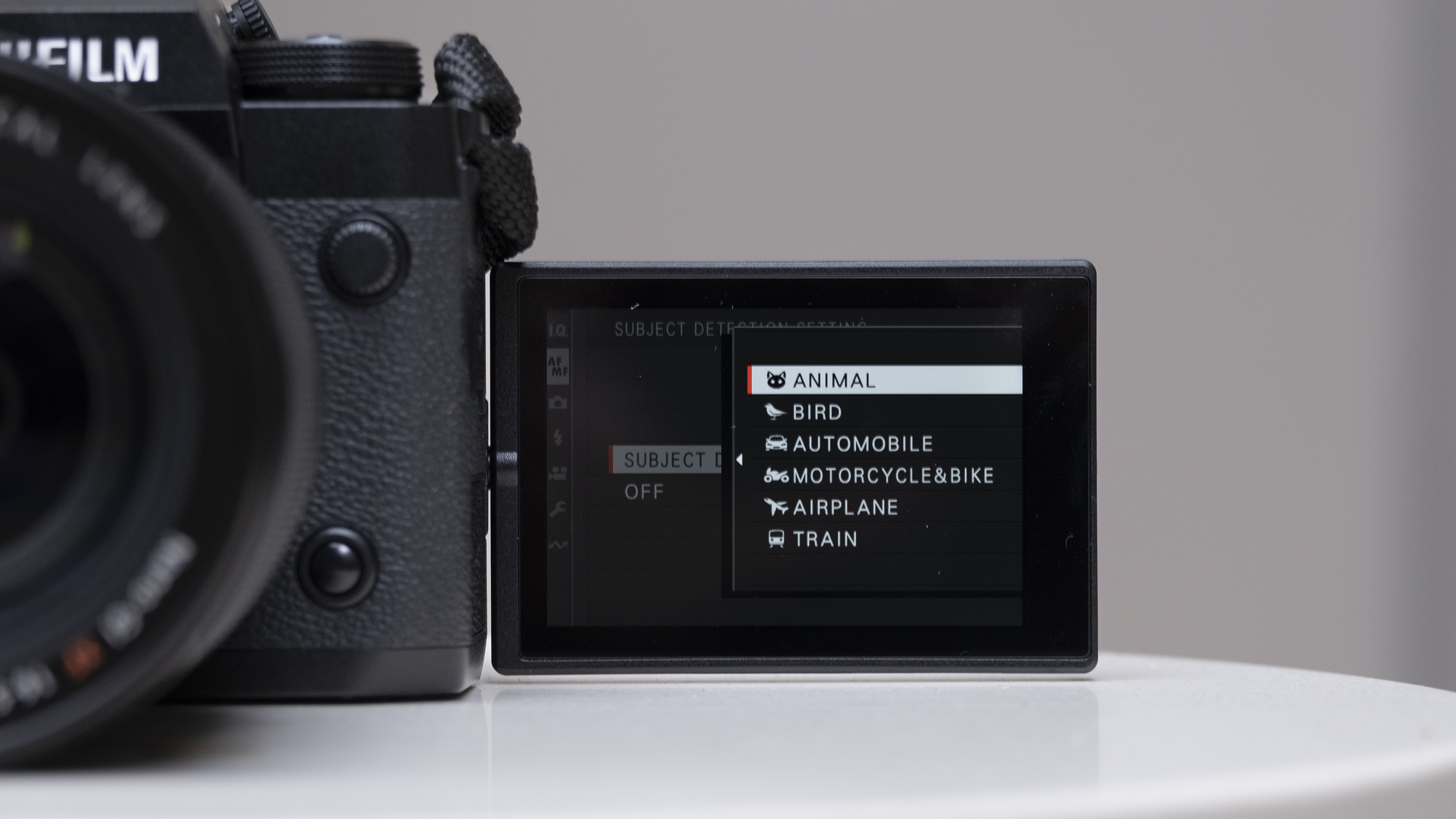
And here it is, the Fujifilm X-H2. We’ve got our hands on a final production sample at the X-Summit and there are no surprises with the design – it’s identical to the X-H2S.
That’s a good thing overall – it doesn’t have the retro charm of the X-T series (no mention of the rumored Fujifilm X-T5 here), but it feels great in the hand with all kinds of lens, and the 5.76-million dot viewfinder really is glorious. It’s hard to go back to older viewfinders when you’ve used this.
Another good question from the livestream audience – are all X-series lenses compatible with the X-H2, given it’s the first 40MP APS-C camera?
One ambassador says they’ve tested it with most of Fuji’s newer lenses and it resolves 40MP resolution fine. Interestingly, Fujifilm adds that it’s putting up a list of lenses on its website to say which ones are most compatible with the X-H2, which is apparently most of X-mount lenses, bar the very old ones.
We don’t yet have a link for that table, but it’s definitely something to look out for and we’ll post the link here when we’ve found it.
Questions coming in from livestream watchers now. One is inevitably about possible noise issues with a 40MP APS-C sensor – one Fuji ambassador says that it was possible to push the ISO up to 6400, and also that any grain has quite a pleasing character anyway. I’m looking forward to seeing how much this bears up with some low-light shooting in New York.
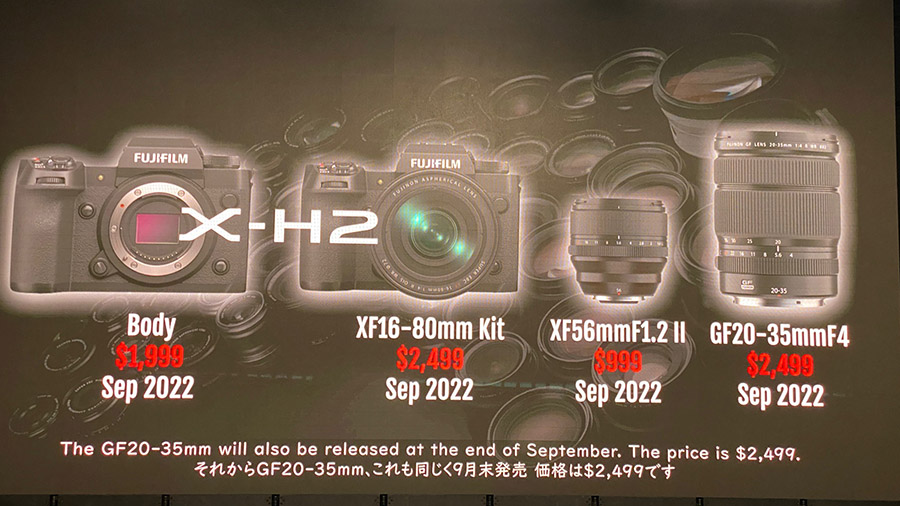
Onto pricing! The X-H2 will cost $1,999 and will be available this month. You’ll also be able to buy it with a kit lens for $2,499.
The XF56mm f/1.2 II will cost $999 (now that’s tempting), while the GF20-35mm f/4 will go for $2,499 (ouch). We’re working on getting some equivalent pricing for other countries right now.
Not many of us can afford the GFX system, but the new GF20-35mm f4 R WR looks like a lovely lens for landscapes and astro. It’s the equivalent of a 16mm–28mm lens in full-frame terms and it’ll cost… $2,499. Oh well, we’ll probably have to stick to the X-H2 plan instead.
Fuji is now suggesting that the new XF56mm isn’t just a portrait lens, even claiming that it’s “more versatile than a zoom lens”.
That seems to be pushing it a bit, but for prime lens fans it certainly looks like a brilliant all-rounder that would likely stay glued to our X-H2 (oh dear, we’re already entertaining buying one).
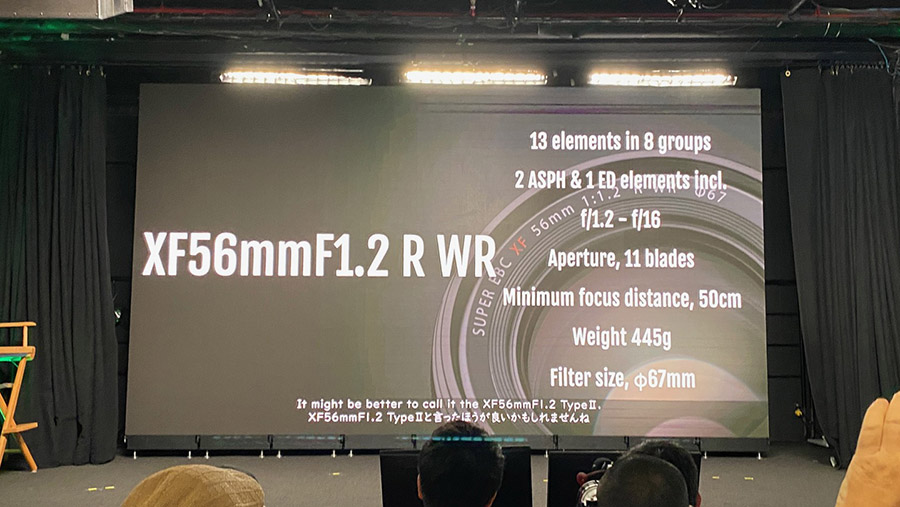
Another nice touch on the XF56mm f/1.2 – a 50cm minimum focus distance, which means even shallower depth of field when shooting up close. Sounds like a fun lens, but how much will it cost? My wallet has just scurried away into safe hiding.
The new Fujifilm XF56mm f/1.2 is official. Exciting stuff for portrait shooters – it has more lens elements (13 in 8 groups) than its predecessor, plus 11 aperture blades for some smooth bokeh.
Fuji had to develop a new actuator to push all of that glass. We’re looking forward to getting our hands on one at the X-Summit to see how fast that AF is.
Onto lenses. Fujifilm says it’s “been preparing for the arrival of the 40MP sensor since 2021”. That suggests that you will need more recent lenses to take advantage of that resolution – which Fuji’s XF18, XF23mm and XF33mm lenses have been designed to do. Buying all of these lenses might starting adding up, though.
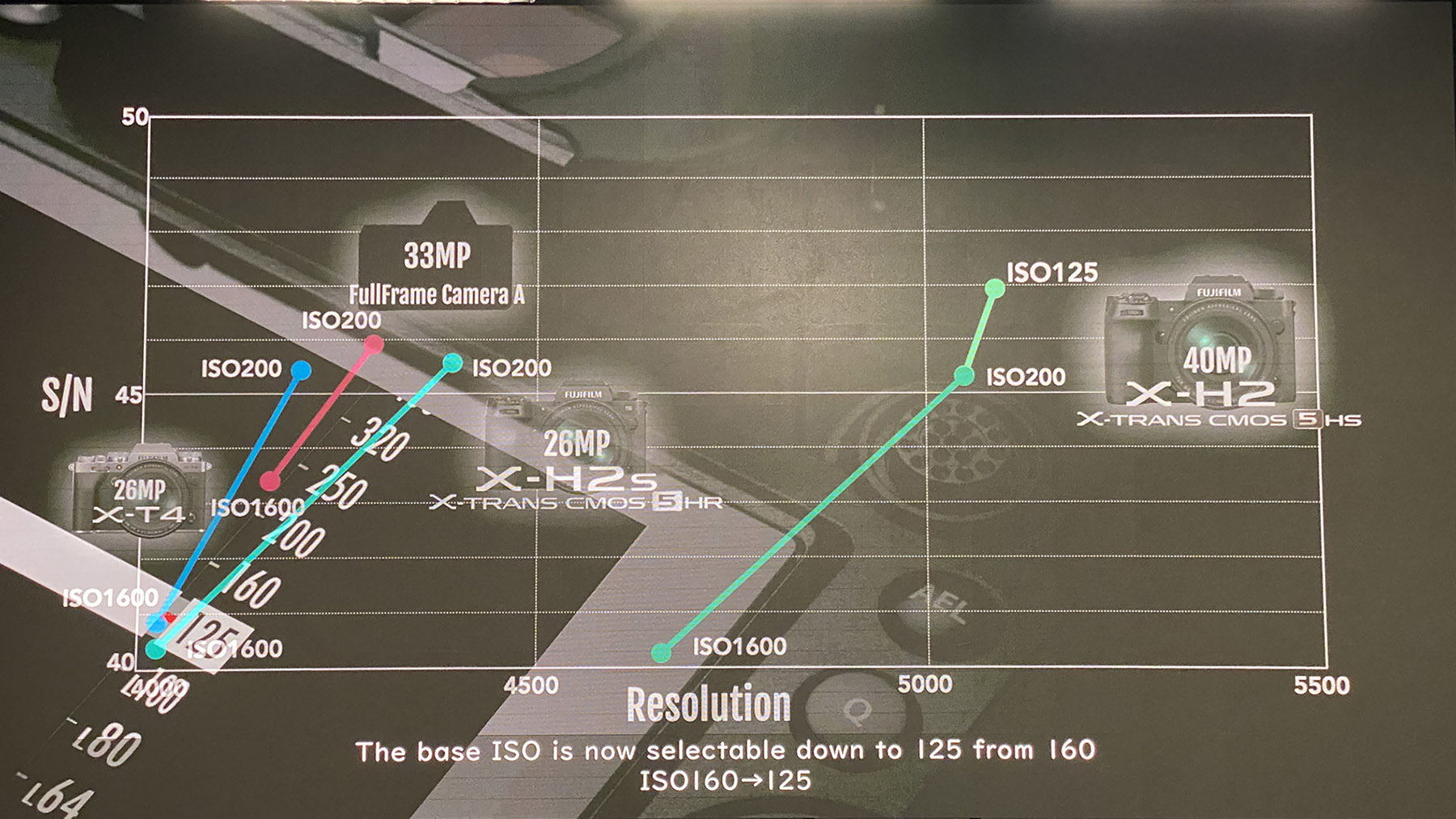
Interesting, Fuji seems to be suggesting that the X-H2 has a lower signal-to-noise ratio than many full-frame cameras at its base ISO. That’s promising news considering noise has sometimes been an issue for high-megapixel sensors.
The X-H2 will also have the AI-based AF system seen on the X-H2S. But will the performance be comparable? That’s not clear yet. It seems likely that X-H2S’ read-out speeds will give it the edge in reality.
The presenter stands on a huge print on the floor to illustrate one of the benefits of that 40MP resolution, cheekily stating that you always upgrade to GFX for something bigger.
Nice, Fuji’s now talking about the X-H2’s Pixel Shift mode, which produced massive 160MP images. But how still does your tripod need to be to get usable results? Apparently, the in-body image stabilization will “eliminate shake altogether”. You combine the resulting images in ‘Pixel Shift combiner’ software.
Fuji sounds very confident about this new sensor in the X-H2. It says it’s “on par with full-frame sensors, especially those with high megapixel counts”. We hope so, given the rumored price of the X-H2.
Fujifilm talks up its two new sensors – the stacked 26MP chip in the X-HS2 and the new 40MP X trans CMOS 5 HR for the X-H2, stating that “it provides images quality beyond APS-C format”. We’re looking forward to seeing it that’s indeed the case.
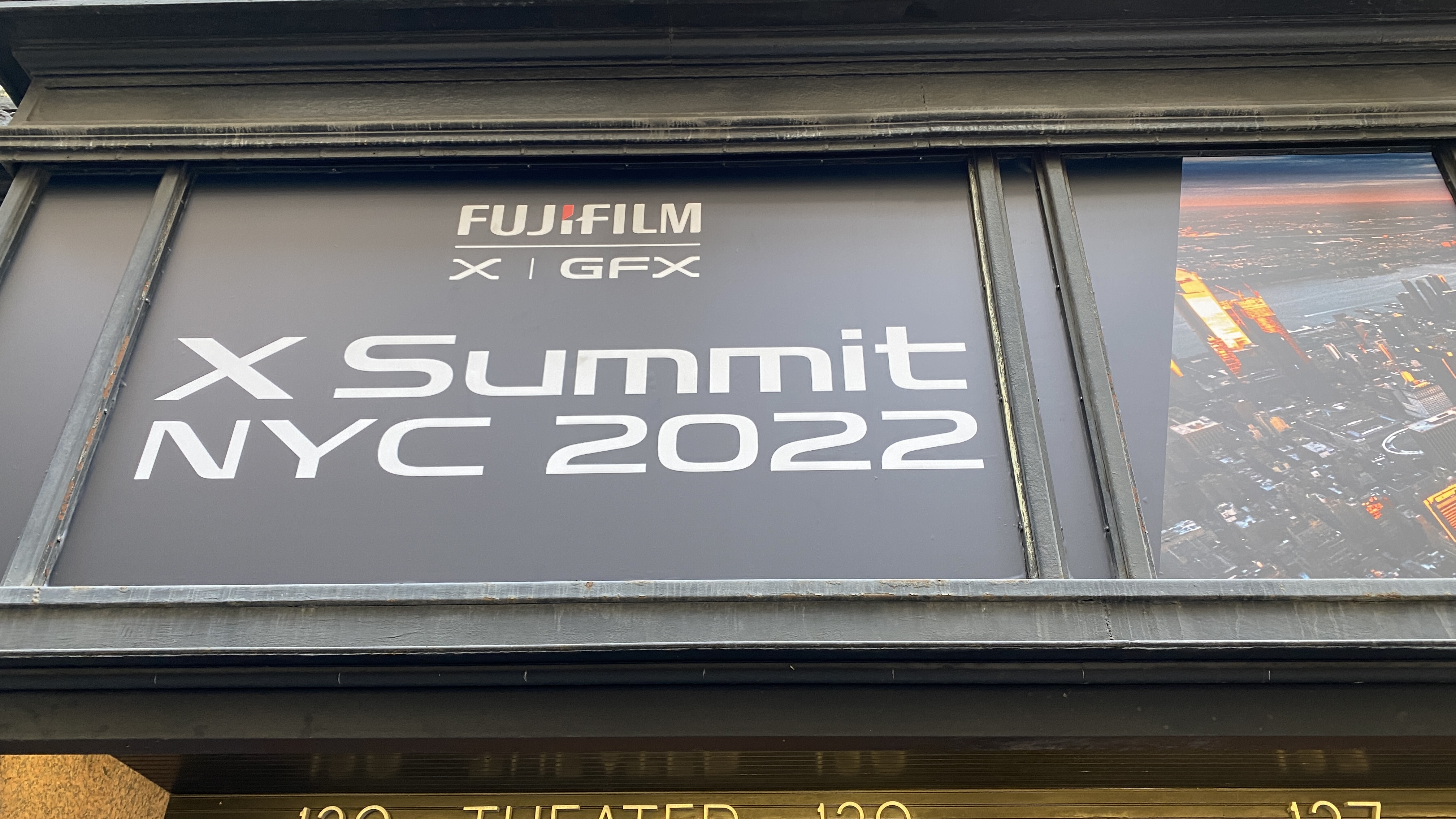
We’re in! The X-Summit is about to kick off and we’re in place waiting for the see the X-H2 confirmed and also hear about some of Fuji’s lesser-know announcements. The Wi-Fi is temperamental though, so images may have to follow later.
Another interesting thing about today’s X-Summit, particularly for those of us who can’t justify buying flagship cameras, is what the X-H2 might tell us about the rumored Fujifilm X-T5.
That camera is likely to be more of an affordable, mid-range mirrorless camera, but will it get the same 40MP sensor and Fuji’s latest autofocus? Fujifilm does like to include Apple-style ‘one last things’ at its X-Summit, so because another teaser will give us some early hints. Right, time to head off to the X Summit!
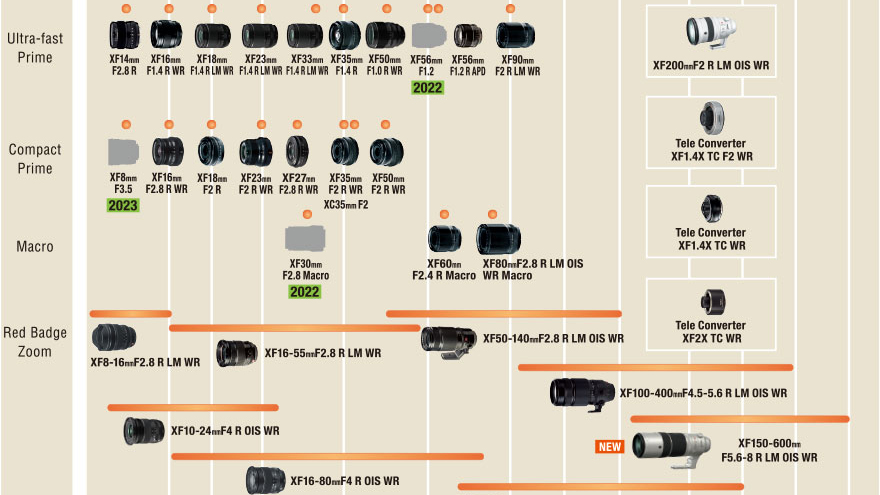
We can probably expect to see Fujifilm’s X-mount lens roadmap (you can see the whole graphic here) get updated today.
The unannounced ones marked as ‘new’ for 2022 are the XF56mm f/1.2 R WR, XF30mm f/2.8 Macro and XF8mm f/3.5. According to the rumors, we’re only likely to see the XF56mm fully announced today, possibly alongside the GF20-35mm F4 R WR. But there’s always room for surprises.
We’ve already recently seen Fujifilm refresh its 18mm, 23mm and 33mm primes – perhaps more lenses that can take advantage of the X-H2’s buckets of resolution are en route.
Talking of lenses, I’m probably as much excited about the launch of the XF56mm f/1.2 R WR as I am the X-H2.
It’s one I’ve been waiting a while for as it sounds ideal for some of my preferred types of snapping (portraits, street, live music).
I already own the XF50mm f/2, which is great for travel, but the combination of that slightly longer focal length, weather-sealing and bright aperture should make it a real zinger, if the rumors are true.
Hopefully it won’t be too much pricier than the current version, which costs $999 / £949.
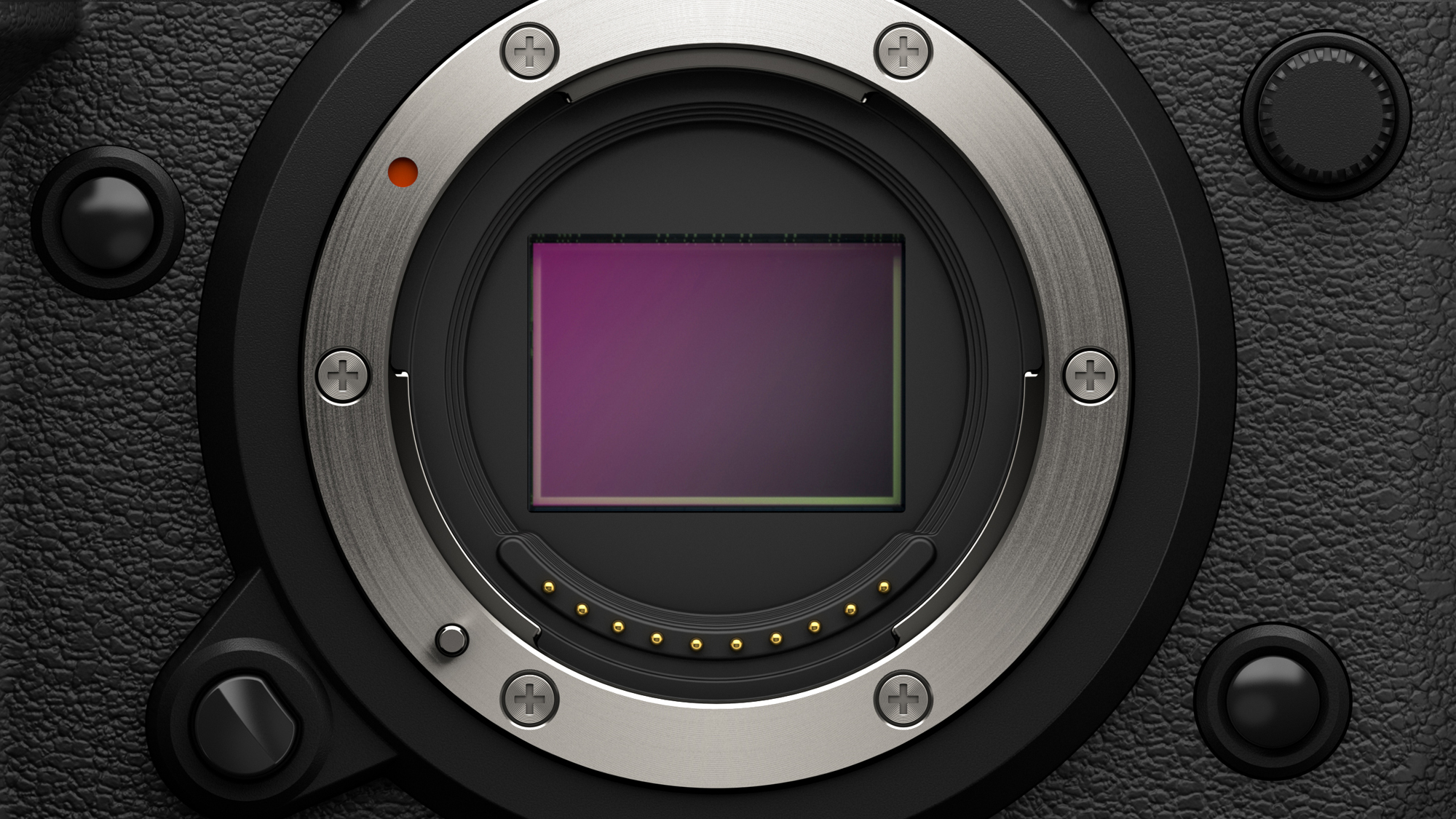
A concern of some Fuji fans (and one I share) is that only the most recent X-mount lenses will have the optical chops needed to really benefit from the X-H2’s new 40MP resolution. After all, a high-resolution sensor is only one half of the photographic pipeline. Most of Fujifilm’s current lenses were designed when 26MP was the resolution ceiling of its cameras. It isn’t that today’s X-mount lenses won’t be good enough for the X-H2, but more whether they’ll offer a big enough boost in detail at 40MP to justify the cost of Fuji’s new camera? That’s something I’m looking forward to finding out later in testing.
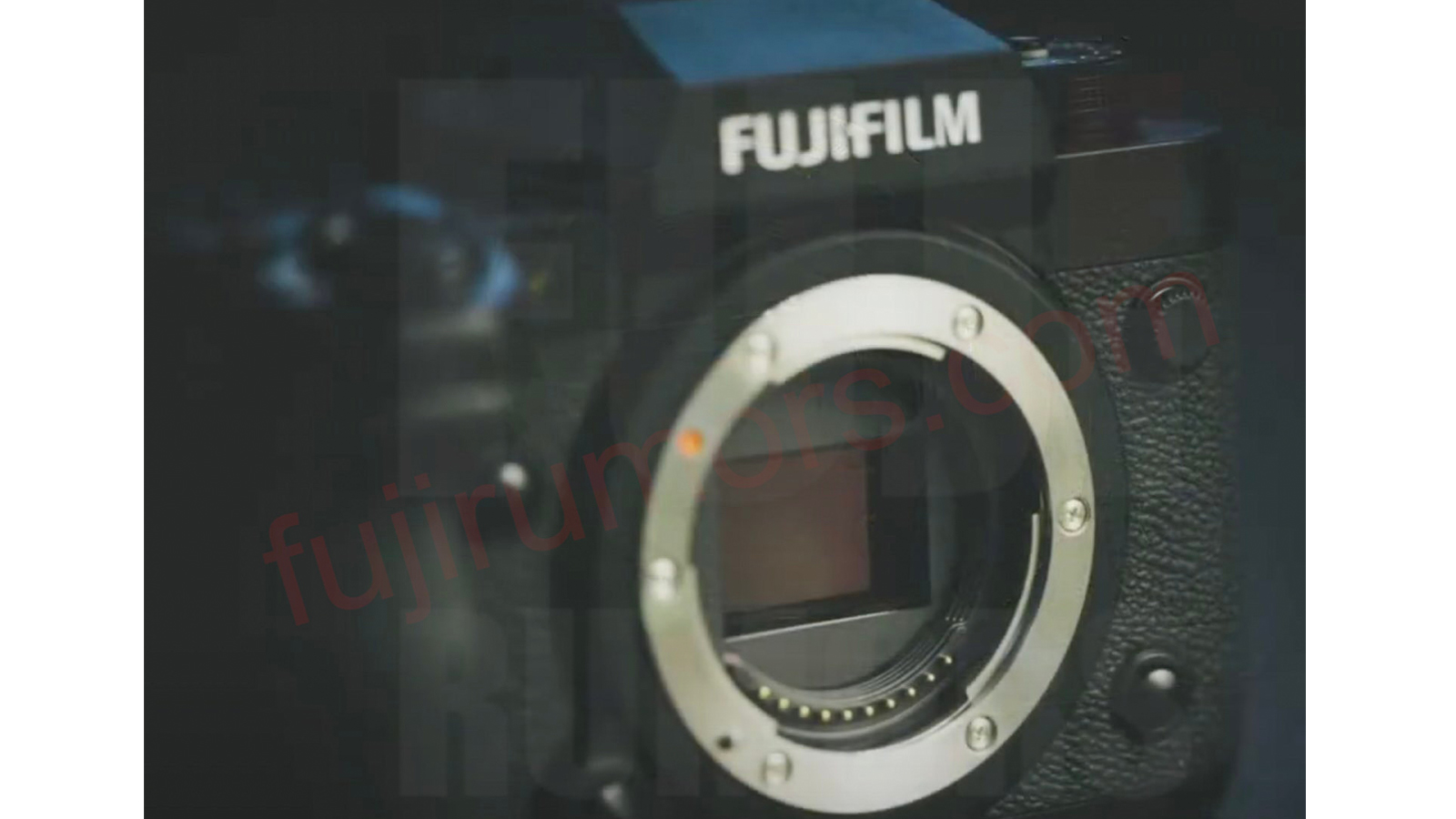
Surprise! The X-H2 has almost completely leaked in recent days. That’s pretty typical of mirrorless cameras today. The only camera I can remember coming out of the blue was the Sony A1. But it does mean we’ve got some advanced warning of what to expect from the X-H2. According to Fuji Rumors, the X-H2 will look identical to the X-H2S and will pair its already announced 40MP X-Trans BSI sensor with the ability to shoot 8K/30p video and photos at a relatively speedy 15fps (with its mechanical shutter). All very promising, but how much will it cost? The figure that’s floating around is $2,000. Not exactly small change in these financially trying times, and particularly steep if you may need to upgrade your lenses to see the benefit of those 40 megapixels. At the same time, there’ll also probably be nothing quite like the X-H2 for pro shooters and well-heeled amateurs.
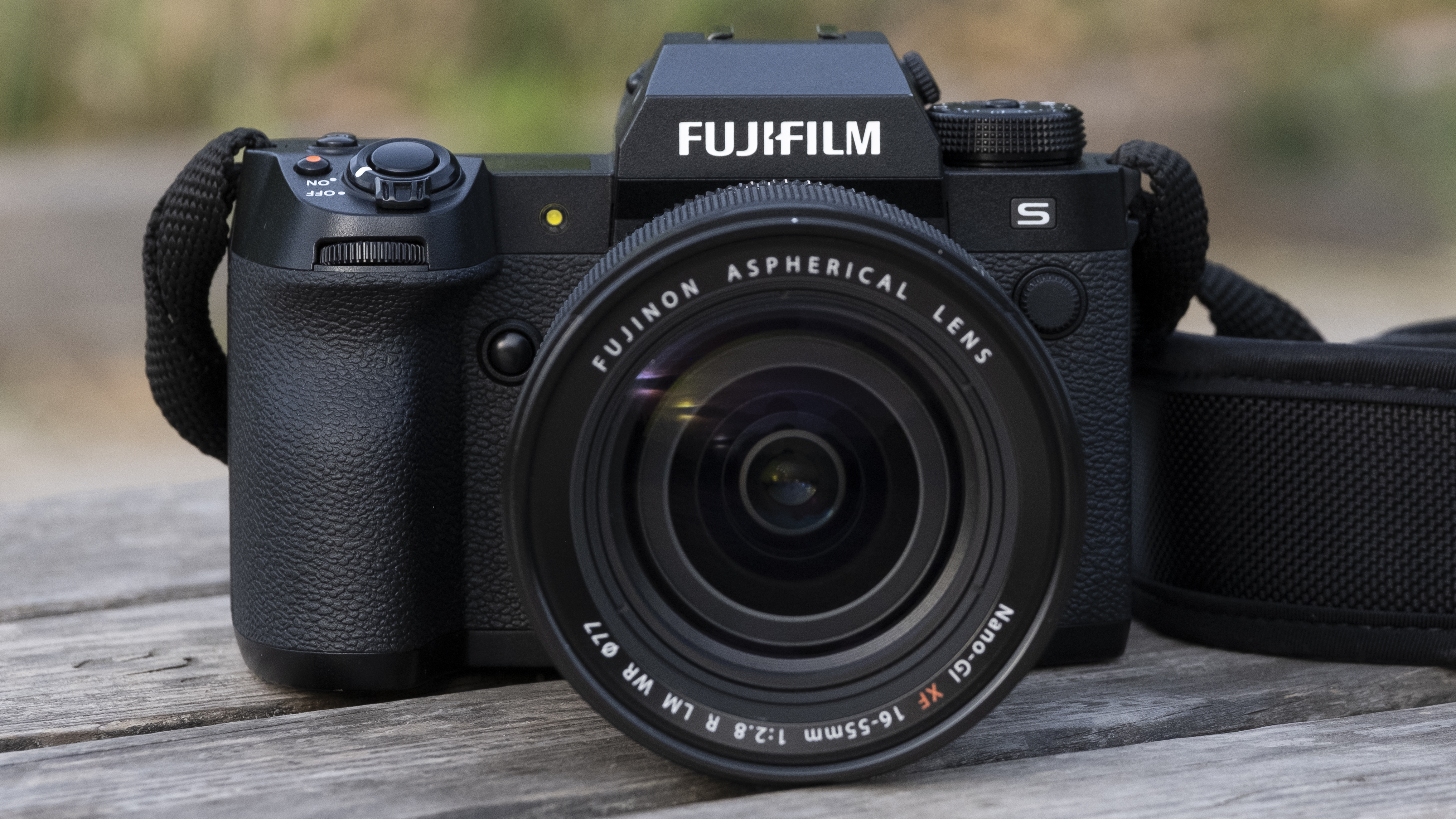
So how promising is this Fujifilm X-H2? It sounds particularly interesting for snappers who prefer shooting more static subjects like rolling hills, portraits, architecture and the like. Videographers may also be keen on its rumored inclusion of 8K video recording. At the X-Summit in May, Fujifilm told us that the camera would bring a new 40MP X-Trans CMOS 5 ‘HR’ sensor, to complement the speedy ‘stacked’ one in the X-H2S. That’s a landmark figure for an APS-C sensor, but landmarks aren’t very exciting on their own. More important is what the X-H2 will let you do with that resolution – and some big leaks have given us a pretty good idea.
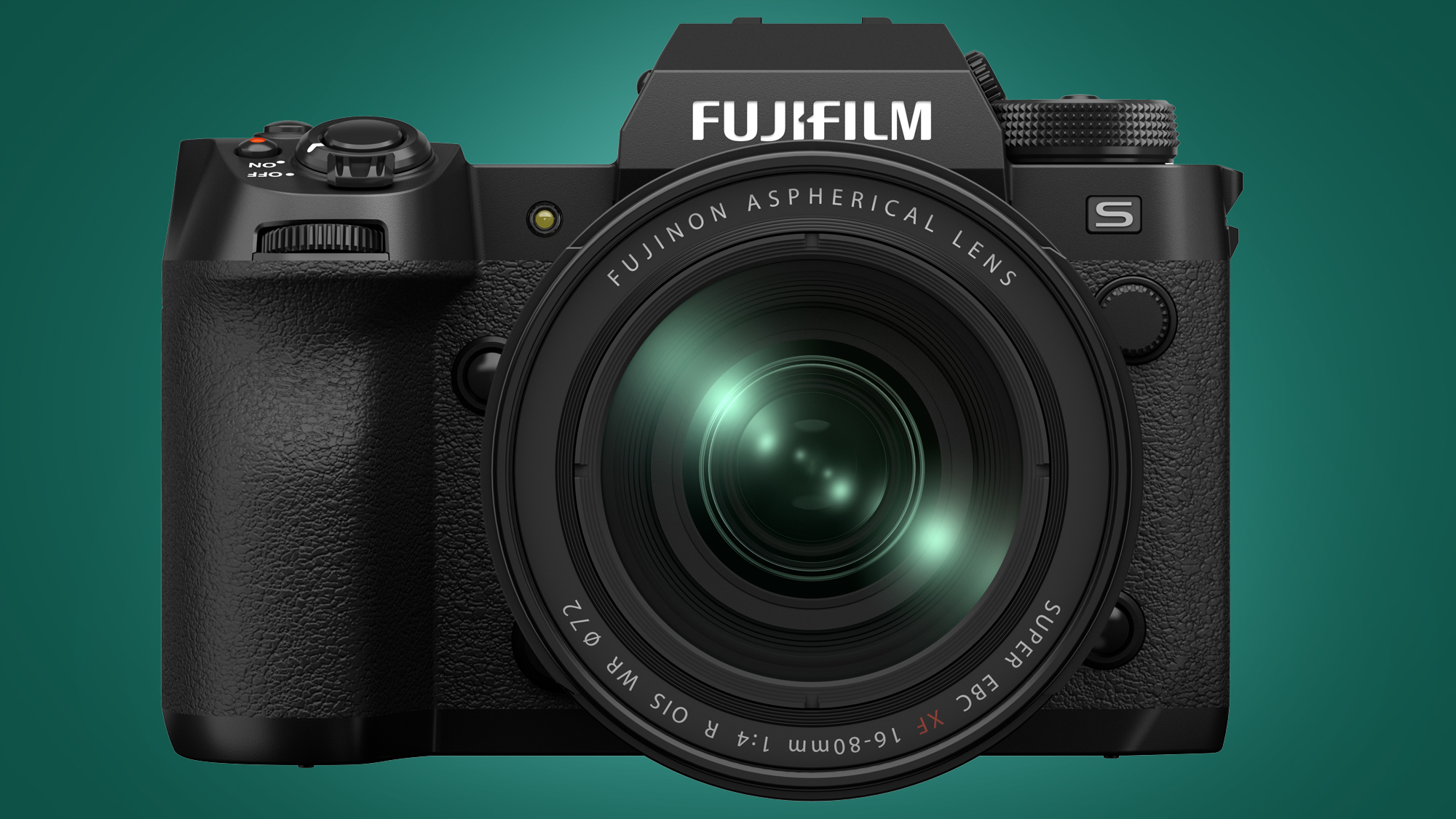
Until recently, Fujifilm’s X-series focused mostly on smaller, retro cameras. Ranges like the X100, X-Pro and X-E series offered relatively large APS-C sensors in compact, film camera-inspired designs. In the grand scheme of mirrorless cameras, they’ve been a small but important niche – particularly for hobbyist shooters. But now Fujifilm is attempting to break into new, professional ground by offering alternatives to today’s full-frame cameras. Its flagship ‘X-H’ line had a bit of a false start with the slightly confused X-H1 in 2018, but this year the X-H line has been reborn. In May we got the impressive Fujifilm X-H2S (above, the ‘S’ is for speed). And now at this year’s X-Summit we’re expecting to see the high-resolution X-H2 join it at the top of the X-Series.
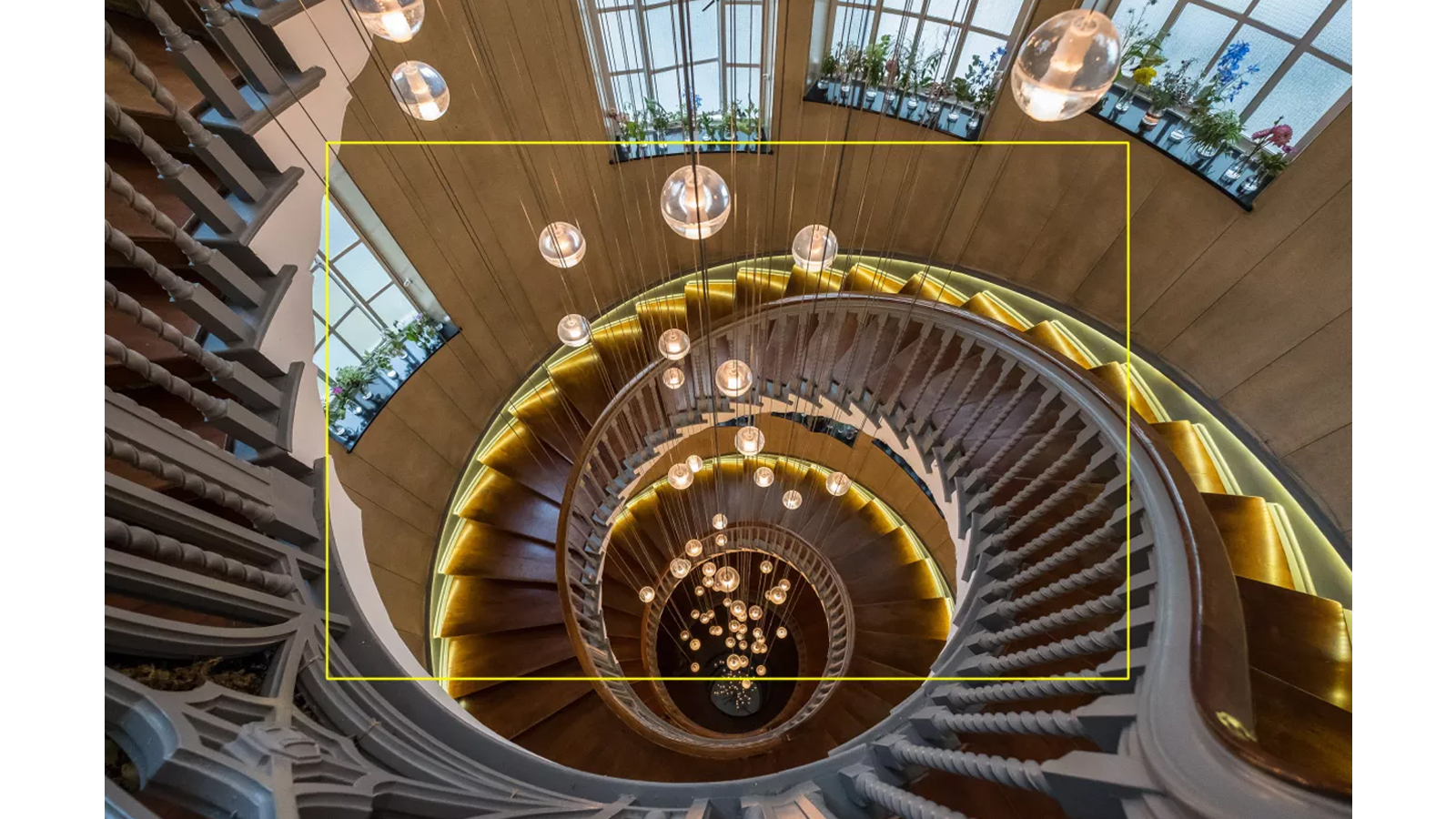
(Image credit: Future)
As Fuji’s X-series are APS-C cameras, let’s quickly do a recap on sensors. Sensor size is still the most important feature in cameras today. Smartphones like the new iPhone 14 Pro have changed the game a bit with their multi-frame processing, but sensors still influence almost everything about a camera’s character and performance. The big trend of the past few years have been full-frame sensors. These offer brilliant dynamic range and low-light performance, but the cameras and lenses can be big, heavy and expensive. Like the Micro Four Thirds system, Fujifilm’s X-series aims to offer an alternative – impressive image quality, but coupled with some unique features, all wrapped up in a smaller, more travel-friendly system. The new X-H series are pretty large for Fujifilm cameras, but the overall system size with equivalent lenses remains smaller than full-frame.
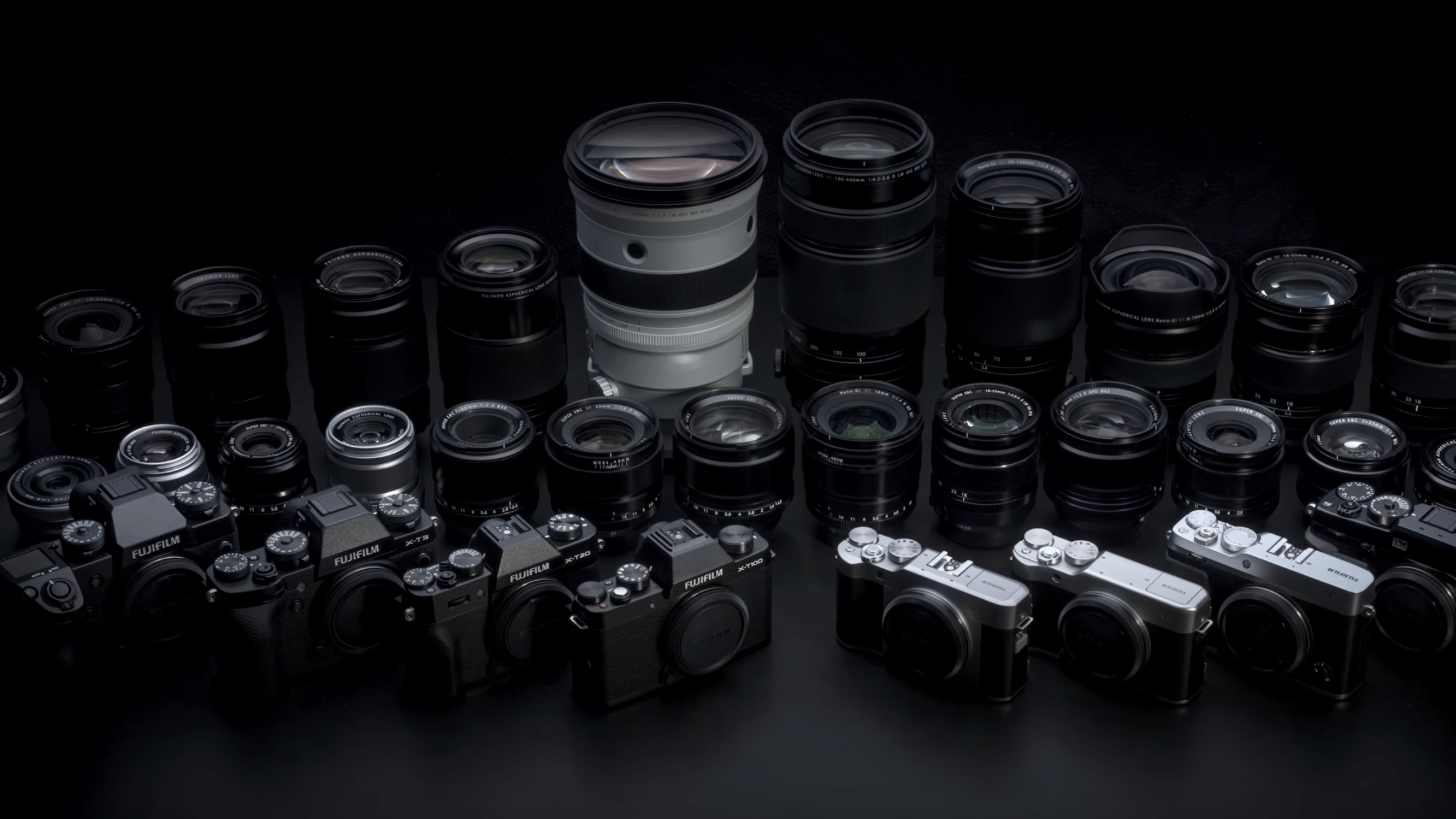
It’s just over three hours until Fujifilm’s X-Summit kicks off. While we prepare to head over to the event in New York, let’s take a step back and look at the X-series and why it’s still popular. Fuji’s mirrorless camera system started life just over a decade ago, with the range celebrating its tenth birthday in January. Ten years is a pretty long time in mirrorless cameras. Back in 2012, camera giants like Canon and Nikon were still mostly focused on DSLRs. But Fujifilm decided to offer something different to the Micro Four Thirds system led by Panasonic and Olympus. It made an APS-C sensor (larger than Four Thirds, but smaller than full-frame) with a unique X-Trans design. And those ingredients are still the foundation of the X-series cameras today, like the new Fujifilm X-H2S. The new Fujifilm X-H2 is expected to be its high-resolution sibling.
Hello, I’m Mark (TechRadar’s cameras editor) and I’m on the ground here in New York for Fujifilm’s big X-Summit event. The fun officially kicks off at 2pm ET / 6pm BST, but over the next few hours I’ll be whetting your photographic appetite by looking at the backstory of Fujifilm’s X-series and who exactly these cameras are for. I’ll also be taking you inside the X-Summit event and pointing my lens into its all of its most interesting nooks and crannies. Unless I get distracted by tall buildings, which is also possible.
